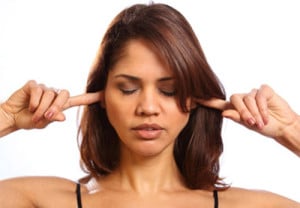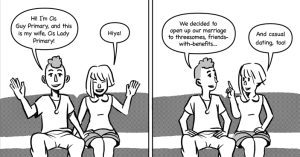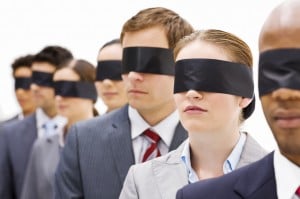Read this article in French here.
As a man, what does gender equality mean to you?
Because while fairness is a valuable goal, equality for equality’s sake isn’t nearly as important as justice – for liberation’s sake.
By naming the problem, we’re not just saying “this is wrong, so let’s fix it.” Instead, we’re inviting you to consider the impact of gender inequality on your life, and we’re encouraging you to make a change for your own sake and for the sake of your community.
Our current cultural expectations, legislative system, and social programming work to sustain a hierarchy that constantly places men on the top. Consequently, men consistently achieve, succeed, and benefit at the expense of every other gender. That’s called male privilege.
But here’s the thing about male privilege: it hurts everyone, including you. This is because accessing male privilege often requires you to conform to a toxic norm of masculinity.
You know this norm – it’s idea that the only “real men” are the ones who don’t show their emotions, who solely value sports and physical strength, who don’t reach out for help when they need support.
And you probably also know that no man completely fits into this narrow box of masculinity, and that our society is unforgiving toward people who don’t fit what they’re “supposed” to be.
So we have to face the ways traditional masculinity is rewarded with privilege in order to liberate everyone from the painful trap of society’s oppressive boxes.
You don’t have to be a bad person to benefit from male privilege, and recognizing your privilege doesn’t mean saying you don’t deserve good things.
But once you understand that these often invisible perks aren’t available to everyone, you can see why addressing privilege means recognizing that people of all genders deserve equal access to basic respect for our humanity. There’s more about this at the end this article, but for now I’ll end with saying I’m so glad you’re taking steps to make a change by reading this article and sharing it with the other men and boys in your life.
Without further ado, let’s face these examples of male privilege in the US so we can make the change we all deserve.
Social Norms
1. You can dominate conversations without being judged. Women are perceived as “too talkative” even when they’re speaking less, with one study showing that women need to make up 60-80% of a group to have equal time in a conversation.
2. You’re less likely to be interrupted when you speak – studies of men and women showed that both interrupted women more than men.
3. You’re not automatically assumed to not know what you’re talking about – or subjected to mansplaining.
4. Common vocabulary favors your gender as the default, with language like “mankind” and “foreman,” and dictionary definitions of words created by men.
5. You’re subject to less scrutiny for the ways you speak – when people criticize “vocal fry,” for example, they’re more likely to point out when women who do it, and ignore men’s vocal fry.
6. You’re not expected to swear less, apologize more, or other supposedly “lady-like” behaviors that reflect stereotypes of your gender being submissive.
7. You’re not expected to step aside if someone of another gender is walking in your path.
8. Social norms allow you to take up more physical space.
9. Perceptions of how much your gender is represented skew in your favor. When a group is comprised of 17% women, men think it’s 50-50, and at 33%, men believe women are the majority.
10. You’re less likely to have strangers expect you to smile – it’s so common for women that it’s sparked a widely praised art project called “Stop Telling Women to Smile.”
11. You can forgo regular grooming during travel, like growing a “backpacker’s beard,” without people judging you for not keeping up with your gender’s expectations, like women shaving their legs.
12. You can buy clothes designed for your gender that have pockets you can actually use – clothes meant for women are often focused on being “slimming,” so purely decorative pockets are common.
13. You can buy a car without salespeople assuming you can be taken advantage of. Chances are, you’ll be offered a better price than a woman.
14. If you’re excluded from mainstream culture, you can find community in “outsider” or counterculture groups like nerd communities without being excluded there also because of your gender.
15. You can get praise for ordinary parental duties or for being a single father, while mothers are simply expected to do the same and even criticized for single motherhood.
16. You’re not said to be going against your gender’s “natural instinct” or your role in society by not having children.
17. You can be outgoing or open about your choices without people calling you an “attention seeker.”
18. You can enjoy traditionally “masculine” hobbies like sports without people saying you’re just doing it to impress men.
Sex and Relationships
19. You’re more likely to be congratulated for having lots of sex, rather than shamed for it or called a “slut.”
20. You’re not judged as a “slut” even for things unrelated to your sex life, like the way you dress or how conventionally attractive you are.
21. You’re not judged as a “prude” for making your own choices about who you don’t want to have sex with.
22. You’re not taught that your sexuality exists only for other people – or stigmatized for masturbating.
23. The media, popular sex advice, and normative definitions of sex focus primarily on your pleasure, especially if you’re cisgender.
24. School sex ed, religious values, and other pervasive sources of sexual norms don’t treat your gender as more dirty, impure, and undesirable for losing your virginity.
25. Most pornography is made with your gender in mind (and it creates some pretty damaging ideas about women and other genders).
26. You can be open about enjoying sex without people feeling automatically entitled to having sex with you.
27. You can make changes to your appearance like a haircut or dye without assumptions that you’re doing it for men.
28. People don’t assume something’s wrong with you if you don’t want to get married – or insist you must be lying, and warn you that “time is running out.”
29. You’re not expected to change your name if you get married or questioned if you don’t.
30. Products like Viagra exist with the aim of helping cisgender men maintain their sex lives as they get older, and social norms congratulate you for doing so. There is far less support for women to continue being sexual beings as they age.
31. You can be expressive about your sexuality in conversation, art, music, and more, without people accusing you of “using your body to get by.”
32. You can participate in kink, BDSM, and other alternative sexual practices without being judged as a “slut” or facing assumptions that you’re not in control of your own sexual choices.
33. You can be non-monogamous without people judging you for going against your gender’s “nature.”
34. If you’re in a relationship with someone of another gender, you’re not expected to do more emotional labor in the relationship.
35. Getting married to someone of another gender doesn’t mean more domestic labor for you – studies show that husbands add an average of 7 extra hours of housework a week for their wives.
Gendered Harassment and Violence
36. You’re less likely to be the target of street harassment. The majority of women have experienced street harassment in their lives, and most of the men who do are queer or gender non-conforming.
37. You can have a casual, friendly interaction with a stranger, like exchanging a smile or responding to a greeting, without worrying about that stranger taking it as a sexual invitation and telling you to “lighten up” if you don’t.
38. You can turn down a date without worrying about being verbally attacked, physically assaulted, or even killed.
39. You can drink in a bar alone unbothered. In many other public spaces, including bookstores, coffee shops, festivals, and more, a woman alone is often assumed to be available for men to talk to and harass.
40. You can travel alone without worrying about being targeted for violence because of your gender.
41. You’re less likely to experience intimate partner violence.
42. You’re less likely to be stalked.
43. You’re less likely to be the victim of revenge porn.
44. You’re less likely to be raped, especially if you never go to prison.
45. You’re less likely to be homeless as a result of intimate partner violence. Half of all homeless women and children in the US are fleeing intimate partner violence.
46. You’re less likely to be physically injured by a partner. Intimate partner violence is the leading cause of injury to women, more than car accidents, muggings, and rapes combined.
47. You’re less likely to be killed by a partner. Researchers estimate that 40 to 70 percent of women who are murder victims were killed by a husband or boyfriend.
48. You can enjoy partying without people blaming your “lifestyle” if you’re sexually assaulted.
49. You’re less likely to be blamed for your own sexual assault based on what you were wearing.
50. You can set a drink down at a party without having to worry about being drugged and assaulted.
51. Common ideas about preventing rape don’t hold you accountable for not perpetuating sexual violence – instead they put the responsibility on women to avoid being victims, and blame on women who are victims.
52. Your choices about your sex life are less likely to be misused to rationalize violence against your gender, like when violent men justify hurting women because they can’t get laid.
53. You can stand in a crowded area like on public transportation without worrying about being groped.
54. You don’t have to carry a lifetime of both constant risks to your safety and constant doubts that you’re telling the truth about it.
Health and Body
55. You can age naturally without being judged for “letting yourself go” if you experience changes like graying hair, gaining weight, or getting wrinkles without using cosmetic products to cover these changes up.
56. Your gender is considered to get “finer with age,” while women are considered less desirable.
57. You’re under less pressure to be thin, and face fewer social and economic consequences of being fat than women do.
58. You aren’t expected to eat less, with ideas of being “lady-like” including dainty portions.
59. Doctors are more likely to take you seriously when you tell them your symptoms.
60. While medical research often ignores women and other genders, you get the benefits like research focusing on the heart attack symptoms you’re more likely to experience.
61. You’re less likely to have your physical illness symptoms attributed to psychological factors. For instance, when men and women with identical symptoms mention stress, doctors are more likely to overlook a woman’s symptoms of heart disease.
62. For diseases that affect your gender more, you don’t have to face skepticism about whether or not it’s a “real disease,” like women with conditions like fibromyalgia and chronic fatigue do.
63. If you’re cisgender, you don’t have issues like period pain and endometriosis associated with your gender, and treatment for pain “as bad as a heart attack” ignored as a result.
64. You’re less likely to have mental health issues dismissed as being “hysterical” or “oversensitive.”
65. You can get diagnosis and treatment for disorders like ADHD without your symptoms being overlooked due to assumptions about the “typical” behavior of your gender.
66. You can show your nipples in public, and are less likely to be harassed overall for showing some skin – even when women in public are using breasts for breastfeeding, they can be subject to harassment.
67. You’re not judged for keeping your natural body hair.
68. You can sweat naturally without being shamed or judged – and the media shows people of your gender sweating from physical activity a lot more often.
The Media
69. You get to have your gender represented in the media as “strong” without writers going out of their way to have a “strong female character” as a unique take. These characters are actually, as Bijhan Valibeigi put it, “rarely strong and barely characters.”
70. Your gender dominates influential media institutions such as the Academy Award voting membership, which is 77% male. Women have far fewer media executive positions and are far less likely to be celebrated for success in categories such as Best Director.
71. Fiction can depict the everyday, mundane lives of people of your gender without being labeled as “men’s fiction” and taken less seriously than so-called “real” literature – like “women’s fiction” and “chick lit.”
72. Writers of your gender are more likely to be published, have their books reviewed, and get other publishing industry attention that gets their books widely read.
73. Film and television characters of your gender have more substantive dialogue. The Bechdel Test measures whether a story includes at least two women who talk to each other about anything other than a man, and a huge number of popular films fail it.
74. Characters of your gender or more often written with a focus on more of their attributes than just their appearance. The recently coined Jane Test looked at descriptions of women in screenplays and found that they almost always centered on the character’s appearance and not much else.
75. Characters of your gender are more likely to know what to do – how often do you see women in movies asking men “What do we do now?” Here’s a video to remind you.
76. A character of your gender in an ensemble cast is less likely to be objectified as a sex symbol in posters and advertisements, like women superheroes are.
77. Successful people of your gender who are athletes, actors, and other public figures are respected by the media for what they do – not just their appearance and clothes.
78. You can easily enjoy sports with athletes of your gender, as men’s sports get more airtime and promotion than women’s sports.
79. Branding and advertisements don’t put limits on your potential from the time you’re a child, sending messages that your gender isn’t smart or that you “need a husband.”
80. Advertisements are a lot less likely to objectify you, portraying you literally as an object or a tool for men’s pleasure, as is so common for women.
81. Romantic films are less likely to portray a character of your gender being stalked as a sweet sign of affection, which creates toxic norms around harassment and intrusion as a way of pursuing you.
82. Comedians of your gender don’t face stereotypes of your gender as universally “unfunny.”
83. You can use the internet without being harassed.
84. You can be an online gamer without being harassed, threatened, or demeaned.
85. In online gaming, you can play characters of your gender that aren’t hypersexualized.
86. Your gender is more represented in film, with women making up 12% of protagonists, 29% of major characters, and 30% of speaking characters in the top 100 grossing films.
87. People of your gender in the media can age naturally without scrutiny, even being said to get “finer with age.” Women in industries like modeling, acting, and TV journalism are more likely to be pushed out of their careers as they age.
88. Your gender is more represented in the documentary industry, with people more likely to trust men with documentaries and give them funding, resources, and recognition for their projects.
Politics and Law
89. If a person of your gender isn’t elected to public office, it’s not because of their gender.
90. A political candidate of your gender doesn’t have to face media scrutiny that reinforces gendered stereotypes of not being suited for leadership.
91. A political candidate of your gender isn’t scrutinized more for his appearance than his abilities.
92. A political candidate of your gender won’t be penalized by the idea that they can’t balance both family life and public office.
93. Politicians of your gender aren’t said to have their abilities negatively affected by bodily functions like menstruation.
94. Fictional media is more likely to show your gender in positions of political leadership, giving the public the impression that you’re naturally born to be in charge.
95. Political leaders of your gender aren’t judged for not demonstrating “lady-like” behavior that’s the opposite of qualities that public views as leadership skills, like confidence or “not being afraid to speak your mind.”
96. You don’t have politicians primarily of another gender making laws to control your gender’s bodies.
97. There are more lawmakers of your gender determining the rules we all have to live by. For instance, women make up not even 20% of Congress.
98. There are more judges and justices of your gender determining how laws should be implemented. For example, the Supreme Court has included 108 men and only 4 women.
100. You can have strong political opinions without people calling you a “feminazi” or judging you for being “opinionated.”
101. You can express your political opinions without people saying you’re just doing it to impress men or are otherwise unqualified to make political decisions because of your gender.
Workplace and Economy
102. You can make choices to have both career and family without people assuming it’s a challenge or an unusual achievement for you to “have it all.”
103. You’re not insulted for going “against your gender’s nature” for choosing to have a career, but not children.
104. If you choose to have children, you’re not questioned about how having a family would hurt your ability to do your job.
105. As a parent, you get more professional opportunities – avoiding the “Motherhood Penalty” that hurts women’s careers if they have children.
106. You’re less likely to take on childcare costs if your children have a mother you don’t live with.
107. You’re paid more for your work. On average, white women earn 78 cents to white men’s dollar, with wages going down to 64 cents for Black women, 54 cents for Latina women, and 59 cents for Native American and Alaska Native women.
108. You get more financial support for your work – like more financing for resources, more funding for start-ups, more lab and office space.
109. You’re assumed to be the leader of your household – so you can avoid stereotypes like assuming you’d have to “check with your husband” about taking a promotion.
110. If you have a “man’s” name on your resume, you’re more likely to get an interview for a more prestigious job than if you had a “woman’s” name.
111. You’re more likely to work in “formal employment,” which is government regulated to insure wages and certain rights, and less likely work in “pink collar jobs,” like domestic labor, which are considered “women’s work” and have less stability, job security, and pay.
112. You have a lower risk of living in poverty. 1 in 7 women and 4 in 10 single-mother families are poor, with the poverty rate for Native American, Black, and Latina women at almost double the rate for white women.
113. If you’re a single father, that doesn’t put your household at the highest risk for poverty – lone mother households are most susceptible.
114. You can negotiate for raises, promotions, and more without being seen as too aggressive.
115. You’re not stereotyped at work as not belonging in higher paid roles, like being mistaken for the nurse if you’re the doctor, or for a secretary when you’re a lawyer.
116. You can put little time into your appearance without a negative impact on your work life, like having people believe you’re unprofessional or not put together.
117. You can spend less on products to maintain your “professional” appearance. Women are expected to spend more on clothing, accessories, and beauty products, even when they’re earning less.
118. You can be assertive at work without being labeled “bitchy” or “bossy.”
119. You’re more likely to be perceived as a leader.
120. You can benefit from “good ol’ boy” networks that are the key to many paths to success.
121. If you’re never promoted, it’s not because of your gender.
122. You’re less likely to be penalized for not putting up with sexual harassment and misogyny from co-workers and bosses – they’re often normalized as part of the workplace, with one survey showing 1 in 3 women experiencing harassment at work.
123. You’re less vulnerable to gender norms trapping you in financial abuse – for women in relationships with abusive men, society’s idea of men as breadwinners can make financial abuse go unnoticed and more difficult to recover from.
124. If you’re careless with money, it’s not attributed to your gender.
125. Hiring managers in well-paid fields like science and technology look for “masculine stereotypes” that lead them to view you as more favorable than a woman candidate. Gender biases make them judge the same qualifications more positively for men.
126. You can get upset at work without people blaming your emotions on “hormones,” “PMS,” or “being oversensitive.”
127. You’re less likely to have your failures at work as a sign that your gender shouldn’t be doing this type of work. This is especially true in male-dominated industries and leadership positions.
128. You can take jobs like service industry positions in restaurants or bars without worrying about normalized sexual harassment based on your gender.
129. You’re not assumed to be responsible for menial “lady” tasks, like decorating for the office party.
130. You’re less likely to be addressed with demeaning language at work, and more likely to be addressed with respect – unlike women who are referred to as “girls” or called nicknames reflecting stereotypes of women as intellectually inferior, like “honey” and “sweetheart.”
131. You can look up to professional role models of your gender in your field and see them lauded for their achievements, not just their appearance.
132. You’re not stuck between the stereotype of your gender being dependent on a partner and the shame directed at women who choose to be or have to be.
133. You’re more likely to be remembered for your own work accomplishments, rather than your marriage or appearance.
134. Your gender is more represented in higher paid positions. For instance, women are fewer than 5% of Fortune 500 CEOS.
135. You can have your skills recognized in well-paid positions like tech fields. For instance, researchers found that women software developers (who make up a very small percentage of the field) had their coding work rated higher than men in a study – unless they revealed their gender.
136. You’re more likely to have your work cited in journalism and political science. Women experts are cited so rarely that some political scientists created Women Also Know Stuff to encourage people to also include the expertise of women.
137. You’re less likely to have people justify not hiring people of your gender with the belief that there are simply “no qualified candidates” of your gender in the field.
138. You’re less likely to work in jobs that commodify “pleasant” emotions, with roles that give “service with a smile,” like flight attendants, assumed to be “natural” roles for women.
139. You’re not expected to put in unpaid emotional labor, like maintaining office harmony, in addition to your work duties. People don’t believe that your gender is just more suited to this often unrecognized and uncompensated work.
140. You’re less likely to have clients and colleagues ask someone of another gender a question that should’ve been directed to you. In one survey, 88% of senior-level women in Silicon Valley reported this happening.
Childhood and Education
141. People give you toys that are more likely to be educational, to develop a range of skills, and to let you imagine a range of career possibilities – while toys considered “girls’ toys” are often limited to beauty, housework and childcare.
142. You can be assertive without being told to “not be so bossy.”
143. Adults compliment you more for your abilities rather than only your looks, and you’re not taught that the most important thing about you is your appearance.
144. School dress codes don’t suggest that your body is inherently shameful or unprofessional, unlike girls who are told that it’s up to them to cover up.
145. Your grades don’t depend on your appearance – studies show that girls are given higher grades based on physical attractiveness, reinforcing that their value is in their looks, not their brains.
146. You get more “esteem building” rewards in school, like being called on first even when you’re not raising your hand.
147. You get a higher amount and quality of attention from teachers, like more substantive feedback that improves your learning.
148. Your energetic behavior and creative energy is encouraged or dismissed with phrases like “boys will be boys.” Girls are taught to be “lady-like,” which includes being more reserved and less outspoken.
149. You’re not told that you’re supposed to be bad at math and science because of your gender.
150. People are more likely to respect your bodily autonomy – they don’t say things like “your father’s going to need a shotgun” to imply that your sexuality belongs to men throughout your life.
151. Clothing made for you doesn’t reinforce stereotypes of your gender as “too pretty” to be smart.
152. You aren’t raised to believe your gender is inherently more delicate or weak with phrases like “you throw like a girl.”
153. As you’re growing up, you have more positive role models of your gender to choose from in media, history books, fiction, and more.
154. Academic resources are more likely to cite the work of people of your gender.
155. If you’re in college, you’re more likely to be judged as knowledgeable by your peers.
156. If you’re in college, you’re more likely to have professors respond to your inquiries, especially if you’re white.
157. At school, you can learn about your gender’s contributions to the world without needing extra electives or men’s studies departments to be included in the curriculum.
Religion (And the Lack Thereof)
158. If you’re religious, you’re much more likely to have religious leaders of your gender, with every major religion led by men.
159. If you’re religious, you’re less likely to be assumed incapable of choosing your religion for yourself, like when people assume that Muslim women need “saving.”
160 If you’re religious, you’re less likely to have your beliefs attributed to “irrationality” and scientific ineptitude natural for your gender.
161. If you’re religious, you’re less likely to have your holy texts like the Bible interpreted in ways that justify mistreating people of your gender – like silencing women – and less likely to have passages that affirm your gender ignored.
162. If you’re religious, you can find a place of worship that doesn’t treat your gender as inferior. For instance, feminist Christian churches exist, but in many areas, the only options for worship are churches that follow patriarchal traditions.
163. If you’re not religious and looking for community, male leadership also dominates the public atheist domain, and leaders often perpetuate sexism in atheist circles, too.
164. You’re not excluded from atheism based on the idea that “rationality” is not characteristic of your gender.
165. You can be part of atheist communities without risking gender-based harassment.
166. Sacred and religious figures and deities like the Christian God are usually portrayed as your gender.
167. You can practice a religion that centers around your gender without facing harassment and backlash. For instance, women-centered sects of Paganism and Wicca sometimes have to deal with misogyny.
Male Privilege is Real, But Intersectionality Means That It Looks Different for Different Men
A list of privileges on its own can give you examples of what privilege looks like, but it’s not a comprehensive explanation of what privilege really means. So now that we’ve gone through the examples, let’s be clear about a few important things.
Examples of male privilege demonstrate how the patriarchy shows up – but they aren’t representations of every man’s life, at every moment. They aren’t things that only men have ever experienced.
It’s just more likely that you’ll get these benefits if you’re a man, because they’re supported by the system of patriarchy.
And since patriarchy doesn’t exist in a vacuum, there are other systems of oppression that affect different men differently. A man walking alone at night generally has the privilege of not being targeted for gender-based violence.
But a man of color may have to worry about being targeted for racist violence. A mentally ill man could be targeted for police brutality. A gay man could be the target of homophobic violence.
These examples don’t invalidate the existence of male privilege, which are benefits denied to people who aren’t men due to their gender. But they show why the context of intersectionality (how different forms of systemic oppression intersect) matters.
It’s also important to note that many conversations and research studies on gender privilege tend to be based on an inaccurate cissexist binary that assume there’s only two genders – male and female.
In other words, we tend to think of male privilege as what men experience, as opposed to what women experience.
But the truth is, everything we’re taught about how we can determine people’s gender at birth and categorize everyone as a man or a woman is wrong.
For example, non-binary, agender, and intersex people are outside of the gender binary of men of women, and transgender women who are treated like “men” aren’t experiencing male privilege.
These realities complicate examples from research on gender oppression, which unfortunately tend to refer only to cisgender men and women. At the end of this article, I’ll share the work of some writers who fill in the gaps of who we tend to erase when we use binary language.
This collection shows the real magnitude of what we’re dealing with when it comes to gender-based oppression. Though some examples may seem small on their own, they show how the larger system of patriarchy is maintained every day.
So What Can You Do About Male Privilege?
This is the world we’re living in – inequality from casual interactions to deeply entrenched gender norms, creating social, legal, and health consequences for people who aren’t men.
So what can you do about it? Use this resource to build awareness. Notice how you’re contributing to these harmful cultural norms. And check out some further reading for next steps on addressing male privilege:
- 5 Simple Ways Men Can Better Respect Women
- So You Want to Be a Male Feminist? Here Are 11 Simple Rules to Follow
- Dear Men: Toxic Masculinity Is Imprisoning Us, and It’s Time to Set Ourselves Free
- 33 Practical Steps Men Can Take To Support Feminism
I thank people like Adrian Ballou, Michal “MJ” Jones, Sam Dylan Finch, and Pidgeon Pagonis for their work in helping us change the erasive language the gender binary relies on.
Some of these male privilege examples appeared on the following lists, so go support these writers as well:
- XY Feminist
- James St. James’ lists of male privilege as experienced by a trans man
- ASU Project Humanities, based on Julian Real‘s “Unpacking the Male Privilege Jockstrap”
- Barry Deutsch’s “A Male Privilege Checklist: An Unabashed Imitation of An Article by Peggy McIntosh”
[do_widget id=’text-101′]
Maisha Z. Johnson is the Digital Content Associate and Staff Writer of Everyday Feminism. You can find her writing at the intersections and shamelessly indulging in her obsession with pop culture around the web. Maisha’s past work includes Community United Against Violence (CUAV), the nation’s oldest LGBTQ anti-violence organization, and Fired Up!, a program of California Coalition for Women Prisoners. Through her own project, Inkblot Arts, Maisha taps into the creative arts and digital media to amplify the voices of those often silenced. Like her on Facebook or follow her on Twitter @mzjwords.
Search our 3000+ articles!
Read our articles about:
Our online racial justice training
Used by hundreds of universities, non-profits, and businesses.
Click to learn more





















